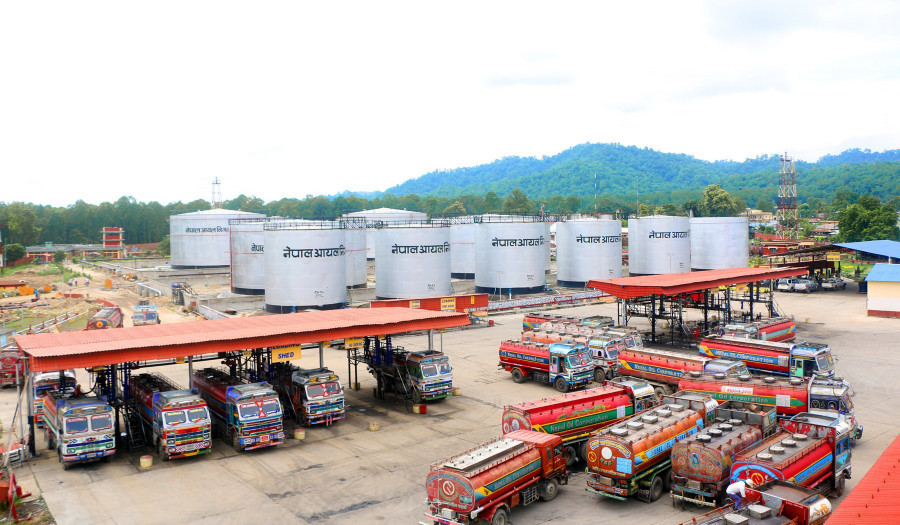
The government is preparing to take its hands off the oil business as rising prices are making it harder to keep subsidising fuel, but insiders say they have heard the story several times before.
Industry Minister Dilendra Prasad Badu told an interaction in Kathmandu on Sunday that the government was doing the necessary homework to deregulate the country’s multi-million-dollar petroleum business.
Minister Badu’s announcement comes nearly a month and a half after Nepal renewed its fuel supply agreement with India, retaining the Indian Oil Corporation as its sole supplier for the next five years.
On April 2, on the sidelines of Prime Minister Sher Bahadur Deuba's visit to the Indian capital New Delhi, the Nepal Oil Corporation and the Indian Oil Corporation signed a new agreement on petroleum supply, prolonging a decades-old supply relationship and government monopoly.
Rising oil prices of late are adding to the government's fiscal burden, and it wants to get out of it as subsidies have become a huge strain on the budget.
Oil is Nepal’s largest import in terms of value. In fiscal 2020-21, it imported petroleum products worth Rs214 billion, a fourfold jump from Rs53.30 billion in 2009-10.
As of the first nine months of the current fiscal year, oil imports had already crossed the Rs257 billion mark, causing financial distress to a cash-strapped Nepal Oil Corporation.
The government is under stress as the corporation has been asking for a handout to keep the subsidy intact.
“We are thinking of inducting private sector participation in the petroleum business,” Badu said. “If we create a separate authority to monitor the sector and allow private firms to import fuel, the market will become competitive and that will benefit the consumer.”
In a country where fuel price increases are deemed to be a politically sensitive issue, any serious attempt at relieving the burden on the state coffers requires concerted action.
“This needs long-term preparations. We are working on it,” said Badu.
But it’s easier said than done.
Nepal’s policy regarding the deregulation of oil has always been inconsistent.
The country started liberalising the trade and investment regime unilaterally in 1992, subsequently becoming the first least developed country to join the World Trade Organisation through the full accession process in April 2004.
Import and export prohibitions and restrictions are maintained in a number of products to protect national security. The petroleum business is one of them.
Former government officials say that when Nepal Oil Corporation is making a profit, no one talks about it. But if losses start to mount, the government comes up with talk about deregulation.
In January 2020, the then Minister for Industry, Commerce and Supplies Lekhraj Bhatta said that the government would not open up the oil trade to the private sector.
“In view of national security, petroleum is sensitive. Therefore, I think we should not bring the private sector into the oil business,” he said.
The government's reluctance to loosen its grip on the oil trade may have been prompted by the massive revenues Nepal Oil Corporation has been raking in recently, say industry watchers.
Until the previous fiscal year, the state-owned oil monopoly was awash in bumper profits. The company’s net profit stood at Rs12.91 billion in 2019-20.
The Covid-19 pandemic and soaring crude prices put a halt to the profit-making streak, and the government company suffered a loss of Rs430.22 million after seven straight years of profits in the last fiscal year.
In the fiscal year 2018-19, the corporation made a net profit of Rs7.5 billion on oil imports. It paid Rs63.85 billion in taxes to the government.
The corporation’s profit has been gradually increasing since 2014 when the automatic pricing mechanism was introduced as per which the price of petroleum products in the country goes up or down based on international prices rather than having the government fix the prices as was the system earlier.
After that, lines of motorists that were a common sight at petrol stations disappeared. Previously, imports would be curtailed to lessen losses, and the resulting shortages set off panic buying.
The queues are coming back. On Monday, most petrol stations had hung signs saying “out of fuel”.
Nepal Oil Corporation hiked the prices of all petroleum products on Sunday, a week after the last increment.
As per the revised rates, petrol costs Rs180 per litre, up from Rs170 previously. The prices of diesel and kerosene have been hiked by Rs10, to Rs163 per litre each. A cylinder of cooking gas now costs Rs1,800 compared to Rs1,600 earlier.
The corporation has jacked up the prices of aviation fuel sold to domestic carriers by Rs10 per litre, and it now costs Rs166 per litre.
The state oil monopoly said its fortnightly losses, after the price revision, would come down to Rs3.35 billion, indicating another imminent hike.
Sushil Bhattarai, deputy managing director of the Nepal Oil Corporation, said the corporation’s losses had ballooned to an all-time high of more than Rs46 billion in the first 10 months of the current fiscal year.
For the first time in eight years, Nepal Oil defaulted on a payment to its supplier Indian Oil Corporation in May. Nepal Oil was able to come up with only Rs20.60 billion out of its Rs43 billion debt, and owes Rs22.40 billion in arrears.
“We are short of cash to finance imports. This may lead to curtailment of deliveries from India like it happened in 2014,” said Bhattarai.
Nepal Oil Corporation was once a chronic loss maker. The company’s financial position started to weaken in the fiscal year 2002-03 when world petroleum prices went into an upward spiral.
Oil prices peaked at $147 per barrel in 2007. Falling prices in 2014 and the automatic price mechanism helped improve its financial health. Brent crude fell to $27.67 a barrel in January 2016—the lowest since 2003.
In 2015-16, the company announced it had finally become debt-free after 14 years. Its debt had swollen to Rs36.87 billion in January 2015.
The corporation paid off all the loans in one and a half years, thanks to falling oil prices in the international market and the new pricing mechanism.
At the height of the scarcity of petroleum products in the country, the government had mulled deregulating the oil market to allow the private sector to import and distribute fossil fuel. Such promises have been made on multiple occasions.
“I don’t know how serious this government is about deregulating the petroleum sector. It looks like a publicity stunt till now,” said former commerce secretary Purushottam Ojha. “The government should be honest. It has been 20 years since the government has been repeating this story. Once the price starts falling and the petroleum crisis ends, the government will forget what it said.”
As per its commitment to introduce reforms in the petroleum sector, the government had in 2004 initiated the liberalisation process.
It had planned to set up an independent authority to oversee the petroleum sector by opening it to private players. The objective was to promote competition and let the market operate freely.
In October 2006, to initiate the process, the cabinet approved the Petroleum Bill drafted by the Ministry of Industry, Commerce and Supplies. In the same year, the bill was tabled at the lower house of Parliament.
“The draft was tabled during my tenure as commerce secretary. But lawmakers, especially from the Maoist party, opposed the bill and it was subsequently withdrawn in 2007,” said Ojha. “The Maoist party's rationale behind withdrawing the bill was national security.”
There is no specific law in Nepal to govern the petroleum business. The government enacted the Petroleum Act in 1983, but it deals with petroleum exploration, mining and distribution of crude oil from oil wells.
Paras Kharel, research director at South Asia Watch on Trade, Economics and Environment, said the government’s priority should be on increasing efficiency and ensuring professional management of Nepal Oil Corporation and expanding its storage capacity, which is a strategic reserve, rather than inducting the private sector into the business in haste.
“A thorough assessment of private sector capacity is needed. Bringing in the private sector alone will not end the fuel price hike,” said Kharel, an economist on international trade and development.
According to Kharel, if the private sector is brought in, prices will have to be adjusted to international levels; and the government will have to think of ways to provide targeted subsidies to the needy.
Earlier attempts to deregulate the oil market had been half-hearted.
At least a dozen reports containing recommendations for the improvement of the corporation are gathering dust on government shelves.
Several high-level petroleum sector reform task forces have recommended ending the monopoly of Nepal Oil Corporation.
In 2010, too, the Commerce Ministry had tabled a new bill in Parliament, but it was sent back for further homework and consultations. And with the frequent changes in government, the law never became a priority.
In January 2013, India’s private petroleum giant Essar Oil, which is now Russian oil company Rosneft-owned Nayara Energy Limited, approached the Nepal government to supply petroleum products.
Subsequent to the Indian company’s approach, in March 2013 the government introduced the Petroleum and Gas Transaction (Regulatory) Orders 2013 which envisaged the opening up of the petroleum business to private investment, but it drew flak from fuel dealers and experts over its effective implementation without related legislation.
Experts had expressed doubts that the regulatory orders will attract massive private investment and address potential risks. According to them, the orders were too weak to govern the petroleum business which has a high investment risk and is volatile in nature.
The orders set the minimum paid-up capital requirement for refining companies, petroleum trading firms, liquefied petroleum gas importing firms and bottling plants at Rs20 billion, Rs10 billion, Rs5 billion and Rs50 million respectively.
The “regulatory orders” would not guarantee the investment of the private sector as the Nepal government could suspend their licence at any time. The orders were subsequently suspended.
On January 13, 2021, the cabinet gave approval, in principle, to the Ministry of Industry, Commerce and Supplies to prepare a draft bill of an integrated petroleum law, which will supersede the Nepal Petroleum Act 1983.
But again there were changes in government with Sher Bahadur Deuba being appointed prime minister in July 2021.
Until 1973, multinational petrochemicals based in India such as Exxon used to supply petroleum products through their own refilling stations in Nepal. In 1974, Nepal signed a memorandum of understanding on petroleum supply with India.
Since then, Indian Oil Corporation has remained the sole supplier for Nepal and Nepal Oil Corporation, the country’s fuel monopoly.
Former government officials who have seen how various governments have acted in the past say there is a lack of understanding as to what Nepal should do with regard to petroleum business.
“What I can say at this point of time is,” said Ojha, the former commerce secretary, “it’s not easy to deregulate the petroleum business.”













